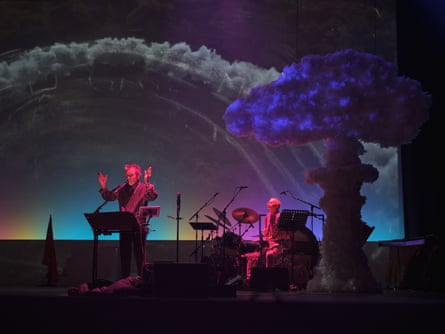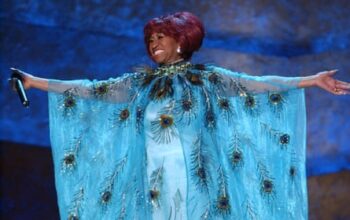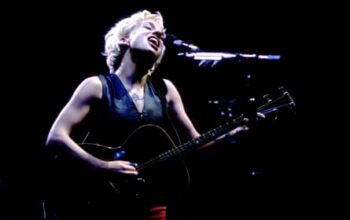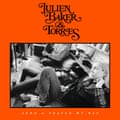The world premiere of Laurie Anderson’s new three-hour multimedia extravaganza begins with a sparkling globe spinning on a big screen like a Christmas tree bauble. Its surroundings are less jolly: a mushroom cloud, a raincloud soon surrounded by thunder, and a low, disturbing drone.
Weaving together music, storytelling, film, animation, a local choir and more, Ark: United States V explores, says its press bumf, “what has brought us here and how much time do we have left”. Its scheduling, just after Donald Trump’s potential election victory, one assumes, was not a coincidence.
It’s also a follow-up. United States I-IV debuted at the Brooklyn Academy of Music in February 1983, where Anderson, then 35, explored life in Ronald Reagan’s America. In two parts split over consecutive nights, it was a similar mix of forms and styles, when climate change was a new-ish kid on the block and the cold war was frosty. Things are arguably chillier now.
That production included her eerie, eight-minute-plus masterpiece O Superman – a surprise No 2 hit in the UK in late 1981 after the support of Radio 1 DJ John Peel, which led to an eight-album deal with Warner Bros. Meshing together the familiarity of a phone call from mother with the failed attempt to rescue US hostages in Tehran in early 1980, she told 60 Minutes presenter Anderson Cooper in 2022, it was a song about how “technology cannot save you”. Recently, funnily enough, it’s had a revival on TikTok.
O Superman doesn’t feature tonight, although other songs and elements of Anderson’s past do, including her arresting 1982 track Walking and Falling. She also begins the show wearing headlamp-lit glasses, just as she ended Part IV more than four decades ago.
Anderson perkily tells us about her show’s whirligig concept. In brief: Parts I-IV were about a religious sect recharting the Old Testament flood, which meant the garden of Eden was around New York City. Part V is about the flood being here, and the need to build an ark. The water comes from clouds made by extreme weather, nuclear fission and the banks of data from our lives that could so easily break down. Oh yes, and Ai Weiwei will play Yahweh (Anderson jokes about the artist ruining her show’s continuity by shaving his head while she was trying to film him), Elon Musk the devil (rendered in supervillain-style cartoons) and Anohni a “Buddhist angel”. Aside from Ai, who occasionally wanders across the backdrop, we barely see or hear them after their introduction.
Anderson’s personality compels throughout, but lots of her show sags. The songs, a mixture of avant-garde jazz and dub reggae pulses, fall flat and are muddily mixed, although musician Doug Wieselman and percussionist Kenny Wollesen are fun to watch, nimbly swapping between instruments as they wander into sets created by projected films. Anderson’s spoken words are also better heard solo. Her penchant for processing her voice into a deep, sinister brogue, a common effect over her decades-long career, retains its strange power.
Exhilaration comes when we’re asked to scream for 10 seconds in tribute to Yoko Ono’s response to Trump’s election in 2016 – an odd joy – and emotion arrives when Anderson reflects on her life. This is when the show properly breathes. The tale of her uncle returning shellshocked from war and screaming in the attic is a perfectly sharpened American short story. Her grandfather’s tall tales about his life, masking a much more upsetting childhood, are delivered through a photo album made by AI. The effect is unsettling but also strangely moving, reframing the relationship between reminiscence and fiction.

Closeup black-and-white footage of Anderson’s late husband, Lou Reed, ends the show’s first half. He disappears as she approaches his image up the stage steps, then the Manchester Sacred Harpsinging group join her and Reed reappears in the rising volume of their voices. Anderson also shares the couple’s tips for life as the show comes to a close: “Don’t be afraid of anyone… get a really good bullshit detector… be really tender.”
The show gels when Anderson, 77, explores approaching the end of her life, in a world where catastrophe and collapse feel ever present. At these points it plays a little like an odd cousin of David Bowie’s final album, Blackstar.
Ark ends with us being directed by Anderson to do awkward tai chi – impossible in theatre seats – which feels somewhat hopeful but also half-arsed. Yet United States V fits its brief in many ways: a show trying to piece together a country and a planet, while also trying to piece together itself.
-
Laurie Anderson: Ark: United States V is at Aviva Studios, Manchester until 24 November
Source: theguardian.com


